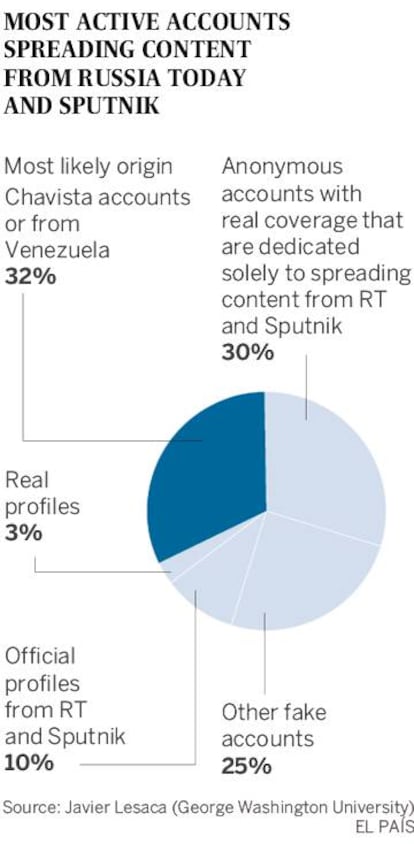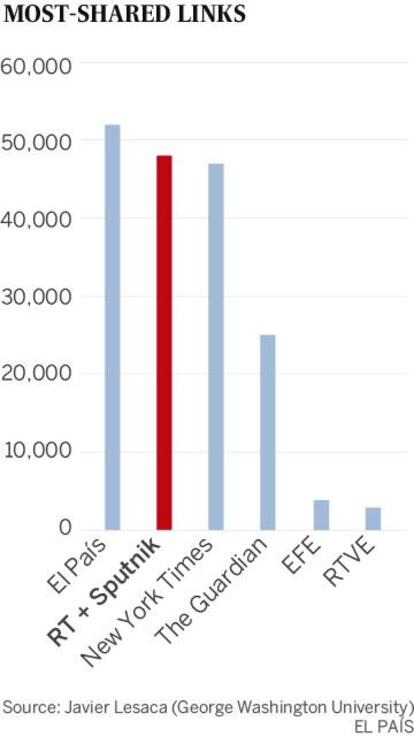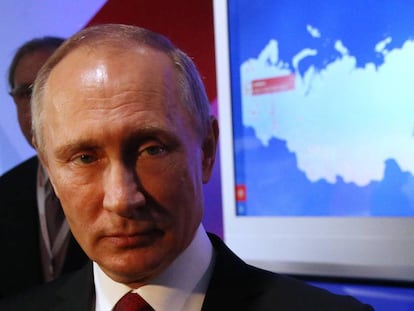Russian network used Venezuelan accounts to deepen Catalan crisis
An analysis of five million messages reveals that RT and Sputnik used social networks to spread a negative image of Spain

Two media outlets linked to the Kremlin, RT and Sputnik, made use of a large number of accounts on social networks related to Venezuela and chavismo in order to propagate a negative image of Spain in the days running up to and after the October 1 referendum on independence in Catalonia. That’s according to a detailed analysis of more than five million messages carried out by George Washington University in the United States. The report warns of the “serious crisis of political and economic reputation in Spain and the EU.”
The principal conclusion of the study is that traditional political leaders and institutions have lost their ability to influence public opinion. In their place now are a variety of actors, who are a lot more difficult to follow and monitor, given that they do not subscribe to the political and media environment of just one country. In the case of the Catalan secessionist drive, the narrative of the pro-Constitution parties in government and the opposition was limited by a complex network of messages originating in pro-Russian media and amplified in part by chavist forces in Venezuela.
To carry out the study, researchers used an advanced software program that makes use of Spanish technology to measure and analyze big data. Its author, Javier Lesaca, is a visiting scholar at the School of Media and Public Affairs at George Washington University. He has analyzed a total of 5,029,877 messages on Twitter, Facebook and other social networks that used the terms Cataluña, Catalunya and Catalonia between September 29 and October 5.
“The most surprising thing about the investigation has been the discovery of an entire army of zombie accounts that are perfectly coordinated and that are dedicated to sharing content generated by RT and Sputnik in diverse digital conversations, which go from Syria and the United States to Catalonia,” Lesaca explains. “There is evidence to suggest that the pattern of digital disruption that has been detected in digital debates about the elections in the United States or Brexit has also been seen in Catalonia, and that the authors of this disruption are the very same.”

After the weekly Cabinet meeting, two ministers recognized on Friday that the Spanish government has corroborated information that during the Catalan crisis disruptive messages were sent from “Russian territory” and added that they had also come from “other locations,” Anabel Díez reports. Government sources later confirmed that these “other locations” referred to Venezuela.
One clear example is the fact that RT published a number of news stories about Catalonia, which were then shared via social networks, prompting a conversation with messages and replies in which one of the most-used terms was #VenezuelaSalutesCatalonia, above mentions of NATO, the EU and Julian Assange, the founder of whistle-blowing website WikiLeaks. With respect to Sputnik, the second most-shared news story was: “Maduro: Rajoy must answer to the world for what he has done in Catalonia.”
Half of the news stories shared by RT in the days immediately prior and after the October 1 referendum in Catalonia were about the police violence during the day, with headlines such as: “Powerful videos: the brutal police repression against voters in the Catalan referendum,” and “Catalonia chooses its destiny between batons and rubber bullets.”
The analysis of the messages on social networks about the Catalan crisis reveals that the two Russian media outlets, both financed by the Kremlin, managed to see their links shared more than those from Spanish public networks EFE and RTVE, or those of private international publications such as The Guardian and CNN. As the report concludes, “the Russian media conglomerates RT and Sputnik have participated in a deliberate disruption strategy in the global digital conversation about Catalonia.”
The platform that they used to propagate and viralize these messages is significant: according to analysis by Lesaca, the majority, 32%, were from chavista accounts or from Venezuela, followed by fake or automated accounts (25%), anonymous accounts that are used just to spread content from RT and Sputnik (30%) and official channels from these two media outlets (10%). Just 3% of the conversation came from real profiles outside of these interest groups. One of the most active accounts was @MarinoEscalante on Twitter, which shared links from RT with messages such as “Rajoy and the Francoist King of #Spain see the mote in the eye of Maduro, but not in #Catalonia.”

This source is confirmed by the analysis of the accounts that, when they publish messages on Twitter, Facebook and other social networks, make their geolocation public. Venezuela is the most-common location after Spain. Of those that shared RT content about the Catalan crisis, 13.18% are in Venezuela. In the case of Sputnik, they account for 10.46%.
As the report states, the majority of anonymous digital profiles analyzed are “associated with accounts or nodes that originate in Venezuela and that clearly show their sympathy toward the regime of Nicolás Maduro, the United Socialist Party of Venezuela or its [deceased] leader Hugo Chávez.” The study adds that in “some cases, these accounts were detected to be publishing the same content at the same time, reinforcing the hypothesis of the use of robots.”
The use of these bots is crucial in this kind of disruption strategy: invented news stories are created, as well as article with a partisan or manipulated angle. Then they are published on a forum, before being spread via social networks and a genuine legion of fake accounts start to share them automatically, triggering digital algorithms to put them in a prominent position.
According to Lesaca, “democratic systems have the obligation to investigate this evidence and implement systematic methods of monitoring and response in the face of presumed disruptions by foreign agents. Wars and international conflicts are already being fought among public opinion.”
A network with Venezuela in the center
The huge framework of accounts on social networks controlled by Russia and chavista forces managed to achieve that a determined interpretation of the Catalan crisis dominated the global conversation on forums such as Twitter. This is shown by the graphic at the top of this story, which visually identifies the most active accounts and the connections between them.
These stories, which habitually described the supposed police brutality on October 1, and on occasion played down the importance of the fact that the referendum had been declared illegal by the Spanish justice system, were shared with greater intensity – the red points – by chavista accounts, which occupied a central role in the social conversation on the crisis in Catalonia.
The videos that were most shared on these networks, for example, were those that showed police charges during the referendum, with alarmist messages and that on occasion were accompanied by opinions that referred to a supposed lack of democracy in the Spanish state in this crisis.
That's to say, there was a conscious and coordinated effort on the part of these accounts in the Venezuelan orbit to amplify as much as possible information from Russian state media outlets RT and Sputnik, something that activists within the Russian orbit, such as Edward Snowden, also did.
The study points to the clear conclusion of this strategy: “The narrative that the pro-independence groups generated, which was opposed to the Spanish government, dominated the conversation in a hegemonic way in English, Spanish and Catalan.”









































